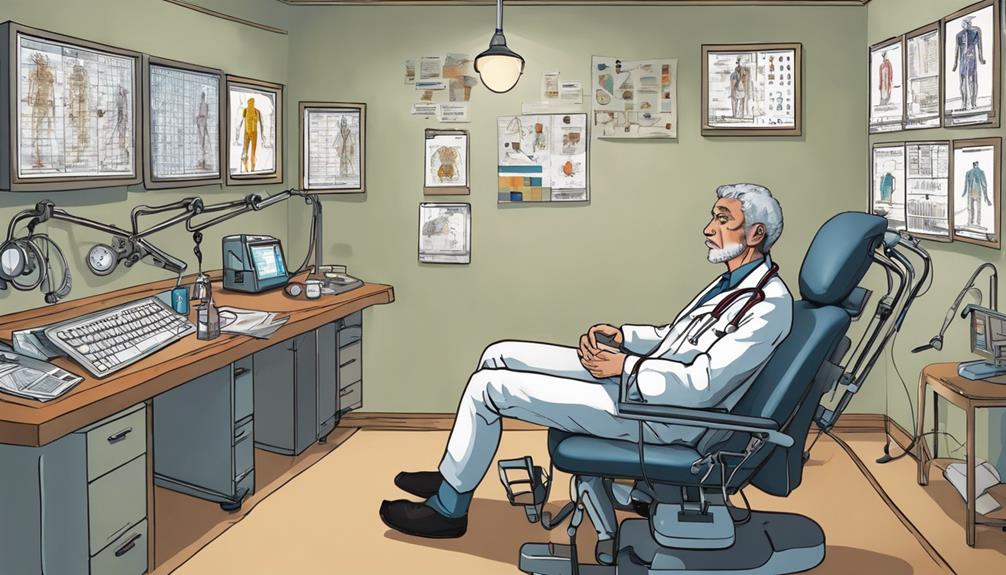Dealing with memory loss caused by seizures involves understanding the link between seizures and memory. It is important to consult a doctor for proper diagnosis and personalized treatment plans. Making adjustments to seizure medications can help improve memory. Participating in cognitive rehabilitation programs can also enhance memory skills. To manage epilepsy, it is crucial to identify triggers and adhere to medication schedules. Practicing deep breathing, meditation, and maintaining a structured routine can be beneficial. Open communication with healthcare providers is key. Engaging in memory-enhancing exercises and following treatment plans diligently are essential. Making lifestyle changes and undergoing memory training can enhance memory retention. Continuously seek effective ways to cope with memory loss due to seizures.
Key Takeaways
- Seek professional diagnosis and treatment for memory loss due to seizures.
- Consider adjusting seizure medications to support memory functions.
- Engage in cognitive rehabilitation programs tailored for memory improvement.
- Maintain good epilepsy control by identifying triggers and adhering to medications.
- Implement coping strategies like deep breathing, meditation, and structured routines.
Understanding Seizure-Related Memory Loss
Understanding how seizures can impact memory is essential for individuals with epilepsy. Seizure-related memory loss can affect both short and long-term memory, attention, multitasking abilities, and language skills. Different types of seizures can impact memory in various ways depending on the brain regions they affect.
During a seizure, the brain struggles to form new memories, leading to disruptions in memory function. Additionally, recovery from seizures may temporarily disturb memory, affecting both recall and retention processes. It's important to note that abnormalities in specific brain lobes often play a significant role in the memory issues associated with epilepsy.
Seeking Professional Diagnosis and Treatment

When experiencing symptoms of memory loss related to seizures, seeking consultation with a primary care provider or neurologist is essential. Diagnosis for epilepsy-related memory loss may involve various tests such as screening, neuropsychological evaluations, brain imaging, brain wave testing, and blood work to identify underlying causes. Once a diagnosis is established, tailored treatment plans can be developed, which may include adjustments to seizure medications for better control and the implementation of cognitive rehabilitation programs to improve memory function. It is also important to address any accompanying anxiety and depression, as these conditions can greatly impact cognitive abilities and memory retention. Regular monitoring and follow-up with healthcare providers are important to track progress and make necessary adjustments in the treatment plan for epilepsy-related memory loss. In some cases, patients experiencing memory issues may also need to be evaluated for other neurological conditions, such as the early symptoms of Parkinson’s disease, which can sometimes overlap with cognitive decline seen in epilepsy. Identifying these conditions early on is crucial for implementing appropriate interventions that can slow the progression of symptoms and improve quality of life. Ongoing communication between patients and healthcare providers plays a critical role in adjusting treatment strategies and maintaining optimal cognitive health.
| Diagnosis | Treatment |
|---|---|
| Screening | Adjusting Seizure Meds |
| Neuropsychological Tests | Cognitive Rehabilitation |
| Brain Imaging | Managing Anxiety/Depression |
| Brain Wave Testing | Follow-up Monitoring |
Tailoring Seizure Medications for Memory Support
To optimize memory support, healthcare providers may adjust seizure medications to minimize cognitive side effects while maintaining seizure control. Some anti-epileptic drugs can be tailored to reduce cognitive impairments and enhance memory functions.
By fine-tuning the dosage or type of seizure medication, individuals can experience a decrease in memory issues while still effectively managing their seizures. It's essential to work closely with healthcare professionals to find the right balance in optimizing seizure medications for memory support.
This tailored approach involves a careful consideration of how to maintain seizure control while minimizing any cognitive side effects that may impact memory retention and cognitive abilities. By optimizing medication in this way, individuals can better manage their seizures while also supporting their memory functions.
Engaging in Cognitive Rehabilitation Programs

Engaging actively in cognitive rehabilitation programs can greatly enhance memory skills and cognitive functions for individuals experiencing memory loss due to seizures. These programs focus on improving thinking and memory skills in individuals with epilepsy-related memory loss by offering tailored exercises and techniques. Therapists work closely with patients to address specific memory challenges and develop personalized strategies for improvement.
Here are three key aspects of cognitive rehabilitation programs:
- Tailored Exercises: Participants engage in activities specifically designed to target memory, attention, and cognitive functions, helping to strengthen these areas over time.
- Personalized Strategies: Therapists collaborate with individuals to create customized plans that address their unique memory difficulties, ensuring a more targeted and effective approach to improvement.
- Guidance and Support: Through cognitive rehabilitation, individuals receive ongoing support and guidance to navigate memory challenges caused by seizures, fostering a sense of empowerment and progress in managing their condition.
Maintaining Good Epilepsy Control
To maintain good epilepsy control, it's important to identify and avoid seizure triggers, such as lack of sleep or high stress levels.
Adhering to prescribed medications is essential in managing seizures and reducing the risk of memory loss.
Regularly monitoring seizure frequency with your doctor helps track progress and adjust treatment plans as needed.
Seizure Triggers to Avoid
Identifying and avoiding known seizure triggers is essential for maintaining good epilepsy control and reducing the risk of memory loss associated with seizures.
To enhance your seizure management plan, consider the following:
- Prioritize ample sleep by establishing a consistent bedtime routine and ensuring you get the recommended hours of rest each night.
- Practice stress-reducing activities such as deep breathing, meditation, or engaging in hobbies you enjoy to help keep stress levels in check.
- Stay consistent with your medication schedule, setting reminders if needed, to minimize the risk of missed doses and potential seizure triggers.
Medication Adherence Importance
Maintaining consistent adherence to prescribed medications is essential for effectively managing epilepsy and reducing the risk of memory impairment and cognitive issues associated with seizures. By following the medication schedule provided by healthcare professionals, individuals can stabilize brain activity, potentially improving memory function and overall cognitive health. Proper medication adherence supports better seizure control, enhancing memory retention and cognitive abilities. Below is a table summarizing the importance of medication adherence in managing epilepsy and its impact on memory and cognitive health:
| Importance of Medication Adherence | Effects on Memory and Cognitive Health |
|---|---|
| Reduces seizure frequency | Minimizes memory impairment |
| Stabilizes brain activity | Improves cognitive function |
| Supports better seizure control | Enhances memory retention |
Monitoring Seizure Frequency
Consistently monitoring seizure frequency plays an essential role in managing epilepsy and addressing memory loss associated with seizures.
- Keeping a seizure diary helps identify patterns and triggers, assisting in seizure management.
- Updating healthcare providers on changes in seizure frequency allows for adjustments in treatment plans, potentially improving memory outcomes.
- Effective seizure control through medications, lifestyle changes, and stress management can lessen the impact of seizures on memory.
Practicing Stress Management Techniques

Practicing vital stress management techniques greatly aids in alleviating the detrimental effects of stress on memory loss triggered by seizures. When stress levels are high, memory issues can worsen for individuals with seizures. Engaging in activities like deep breathing, meditation, and mindfulness can effectively reduce stress and improve memory function. Incorporating these techniques into a daily routine can make a significant difference in memory retention. Additionally, regular physical exercise plays an essential role in stress management, which positively impacts memory outcomes. Creating a structured daily schedule with achievable goals can contribute to stress reduction and better memory outcomes for those experiencing seizures. Below is a table highlighting some stress management techniques that can help alleviate memory loss associated with seizures:
| Stress Management Techniques | Description | Benefits |
|---|---|---|
| Deep Breathing | Focus on slow, deep breaths | Calms the mind |
| Meditation | Practice mindfulness | Reduces stress levels |
| Structured Routine | Establish a daily schedule | Promotes consistency |
Collaborating With Healthcare Providers

When collaborating with healthcare providers about memory loss caused by seizures, we should prioritize communication with our doctors. Sharing our complete medical history allows healthcare providers to tailor treatment plans specifically for our needs.
Following the treatment plans recommended by our doctors is essential for managing memory challenges effectively.
Communication With Doctors
Effective collaboration with healthcare providers is key to understanding and managing memory loss caused by seizures. When communicating with doctors about memory challenges related to epilepsy, consider the following:
- Be Open and Honest: Share your struggles and concerns openly with your doctor to enable a collaborative approach in finding solutions.
- Ask Questions: Don't hesitate to ask your doctor about any aspect of your memory loss or seizures that you don't understand. They're there to help guide you.
- Follow Through: It's crucial to follow the treatment plans and recommendations provided by your healthcare team diligently. Consistent communication and adherence to the plan can lead to improvements in managing memory issues caused by seizures.
Sharing Medical History
To effectively address memory loss caused by seizures, sharing our detailed medical history with healthcare providers is essential for collaborative treatment planning. By providing information on seizure types, frequency, and triggers, healthcare professionals can better understand the factors contributing to memory challenges.
Open communication about medication adherence and any side effects is vital for managing memory issues effectively. Additionally, sharing updates on memory improvements or setbacks allows for adjustments in treatment plans to be made promptly.
In some cases, brain imaging may be recommended to further investigate the impact of seizures on memory. Collaborating with healthcare providers guarantees personalized care and increases the likelihood of achieving positive outcomes in memory restoration.
Following Treatment Plans
Collaborating with healthcare providers is essential for effectively managing epilepsy-related memory loss. It's critical to follow treatment plans to improve memory function and prevent further brain damage. Here are three key steps to take into account:
- Medication Adherence: Taking prescribed medications as directed by healthcare professionals is crucial in controlling seizures and minimizing memory loss.
- Lifestyle Modifications: Implementing healthy habits such as regular exercise, balanced nutrition, and sufficient sleep can support overall brain health and potentially enhance memory retention.
- Cognitive Rehabilitation Programs: Participating in cognitive rehabilitation programs recommended by healthcare providers can help address memory challenges more effectively and promote cognitive function.
Participating in Memory-Enhancing Exercises

Engaging in memory-enhancing exercises, such as puzzles and memory games, can greatly improve cognitive function for individuals experiencing memory loss due to seizures. These activities are specifically designed to stimulate the brain and target memory encoding, storage, and retrieval processes.
By regularly engaging in memory-enhancing exercises, individuals can experience noticeable enhancements in memory retention and recall abilities. Memory training programs tailored to address memory deficits caused by seizures can be particularly effective in improving overall memory performance. These programs focus on enhancing specific memory skills through structured exercises and activities.
Frequently Asked Questions
What Helps Memory Loss After a Seizure?
Engaging in cognitive exercises, ensuring adequate sleep, managing stress, avoiding brain-impairing substances, and seeking regular healthcare monitoring can aid in memory retention post-seizures. These habits and support systems contribute to memory improvement.
Why Can't I Remember Anything After a Seizure?
After a seizure, memory loss can occur due to disrupted brain activity. It's common for memory issues to arise post-seizure, but they typically resolve as the brain recovers. Factors like seizure type and frequency play a role.
Do All Seizure Meds Cause Memory Loss?
Consulting a healthcare provider is crucial for personalized guidance on managing memory issues related to seizure medications, as not all seizure meds cause memory loss, but some can have this side effect.
Can You Remember a Grand Mal Seizure?
Yes, we can remember a grand mal seizure. However, during the event, our brain experiences abnormal electrical activity, impacting memory formation. Postictal confusion may lead to memory deficits regarding the seizure episode.
Conclusion
To sum up, tackling memory loss caused by seizures is like starting on a demanding journey with twists and turns. By seeking professional help, customizing medications, participating in cognitive exercises, and managing stress, we can pave the way towards better memory retention.
Remember, with determination and support from healthcare providers, we can overcome obstacles and strengthen our memory skills. Stay focused, stay resilient, and never underestimate the power of perseverance in the face of adversity.









